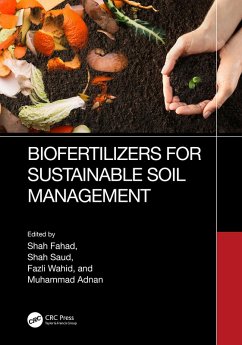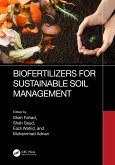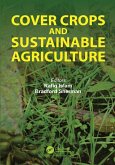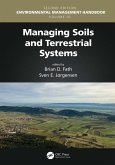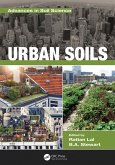Biofertilizers for Sustainable Soil Management (eBook, PDF)
Redaktion: Fahad, Shah; Adnan, Muhammad; Wahid, Fazli; Saud, Shah
52,95 €
52,95 €
inkl. MwSt.
Sofort per Download lieferbar

26 °P sammeln
52,95 €
Als Download kaufen

52,95 €
inkl. MwSt.
Sofort per Download lieferbar

26 °P sammeln
Jetzt verschenken
Alle Infos zum eBook verschenken
52,95 €
inkl. MwSt.
Sofort per Download lieferbar
Alle Infos zum eBook verschenken

26 °P sammeln
Biofertilizers for Sustainable Soil Management (eBook, PDF)
Redaktion: Fahad, Shah; Adnan, Muhammad; Wahid, Fazli; Saud, Shah
- Format: PDF
- Merkliste
- Auf die Merkliste
- Bewerten Bewerten
- Teilen
- Produkt teilen
- Produkterinnerung
- Produkterinnerung

Bitte loggen Sie sich zunächst in Ihr Kundenkonto ein oder registrieren Sie sich bei
bücher.de, um das eBook-Abo tolino select nutzen zu können.
Hier können Sie sich einloggen
Hier können Sie sich einloggen
Sie sind bereits eingeloggt. Klicken Sie auf 2. tolino select Abo, um fortzufahren.

Bitte loggen Sie sich zunächst in Ihr Kundenkonto ein oder registrieren Sie sich bei bücher.de, um das eBook-Abo tolino select nutzen zu können.
The alkaline calcareous nature, high pH, salinity, heavy metals pollution and low organic matter content of the soils in many parts of the world have diminished the soil fertility and made essential nutrients unavailable to crops.
- Geräte: PC
- mit Kopierschutz
- eBook Hilfe
Andere Kunden interessierten sich auch für
![Biofertilizers for Sustainable Soil Management (eBook, ePUB) Biofertilizers for Sustainable Soil Management (eBook, ePUB)]() Biofertilizers for Sustainable Soil Management (eBook, ePUB)52,95 €
Biofertilizers for Sustainable Soil Management (eBook, ePUB)52,95 €![Soil Management for Sustainable Agriculture (eBook, PDF) Soil Management for Sustainable Agriculture (eBook, PDF)]() Soil Management for Sustainable Agriculture (eBook, PDF)154,95 €
Soil Management for Sustainable Agriculture (eBook, PDF)154,95 €![Cover Crops and Sustainable Agriculture (eBook, PDF) Cover Crops and Sustainable Agriculture (eBook, PDF)]() Cover Crops and Sustainable Agriculture (eBook, PDF)57,95 €
Cover Crops and Sustainable Agriculture (eBook, PDF)57,95 €![Managing Soils and Terrestrial Systems (eBook, PDF) Managing Soils and Terrestrial Systems (eBook, PDF)]() Managing Soils and Terrestrial Systems (eBook, PDF)57,95 €
Managing Soils and Terrestrial Systems (eBook, PDF)57,95 €![Urban Soils (eBook, PDF) Urban Soils (eBook, PDF)]() Urban Soils (eBook, PDF)48,95 €
Urban Soils (eBook, PDF)48,95 €![Agricultural Biotechnology (eBook, PDF) Agricultural Biotechnology (eBook, PDF)]() Agricultural Biotechnology (eBook, PDF)52,95 €
Agricultural Biotechnology (eBook, PDF)52,95 €![Environmental Plant Physiology (eBook, PDF) Environmental Plant Physiology (eBook, PDF)]() Vir SinghEnvironmental Plant Physiology (eBook, PDF)54,95 €
Vir SinghEnvironmental Plant Physiology (eBook, PDF)54,95 €-
-
-
The alkaline calcareous nature, high pH, salinity, heavy metals pollution and low organic matter content of the soils in many parts of the world have diminished the soil fertility and made essential nutrients unavailable to crops.
Dieser Download kann aus rechtlichen Gründen nur mit Rechnungsadresse in A, B, BG, CY, CZ, D, DK, EW, E, FIN, F, GR, HR, H, IRL, I, LT, L, LR, M, NL, PL, P, R, S, SLO, SK ausgeliefert werden.
Produktdetails
- Produktdetails
- Verlag: Taylor & Francis eBooks
- Seitenzahl: 278
- Erscheinungstermin: 22. August 2023
- Englisch
- ISBN-13: 9781000926651
- Artikelnr.: 68290537
- Verlag: Taylor & Francis eBooks
- Seitenzahl: 278
- Erscheinungstermin: 22. August 2023
- Englisch
- ISBN-13: 9781000926651
- Artikelnr.: 68290537
- Herstellerkennzeichnung Die Herstellerinformationen sind derzeit nicht verfügbar.
Dr Shah Fahad is working as Assistant Professor in the Department of Agronomy, Abdul Wali Khan University Mardan, Khyber Pakhtunkhwa, Pakistan. He obtained his PhD in Agronomy from Huazhong Agriculture University, China, in 2015. After doing his postdoctoral research in Agronomy at the Huazhong Agriculture University (2015-17), he accepted the position of Assistant Professor at the University of Haripur. He has published over 430 peer-reviewed papers (Impact factor 1834.76) with more than 370 research and 60 review articles, on important aspects of climate change, plant physiology and breeding, plant nutrition, plant stress responses and tolerance mechanisms, and exogenous chemical priming-induced abiotic stress tolerance. He has also contributed 80 book chapters to various book editions published by Springer, Wiley-Blackwell, and Elsevier. He has edited seventeen book volumes, including this one, published by CRC press, Springer, and Intech Open. He won Young Rice International Scientist award and distinguish scholar award in 2014 and 2015 respectively. He won 17 projects from international and national donor agencies. Dr Shah Fahad figured in the Clarivate's 2021and 2022 lists of Highly Cited Researchers in the field of Plant and Agriculture sciences. His name included among the top two percent scientists in a global list compiled by the Stanford University, USA. He has worked and is presently continuing on a wide range of topics, including climate change, greenhouse emission gasses, abiotic stresses tolerance, roles of phytohormones and their interactions in abiotic stress responses, heavy metals, regulation of nutrient transport processes. Dr. Shah Saud received his Ph.D. and Post Doctorate in Turf grasses (Horticulture) from Northeast Agricultural University, Harbin, China. He is currently working as Assistant Professor in College of Life Science, Linyi University, China. Dr. Shah Saud has published over 200 research publications in peer-reviewed journals. He has edited 6 books and written 40 book chapters on important aspects of plant physiology, plant stress responses, and environmental problems in relation to agricultural plants. According to Scopus®, Dr. Shah Saud's publications have received roughly 8566 citations with an h-index of 44. Dr. Fazli Wahid has completed PhD in the field of Soil microbiology and plant nutrition from the The University of Agriculture Peshawar and University of Natural resources and life Sciences Vienna Austria. He has also completed his postdoc from Nigde University Turkey in plant nutrition. Currently, he is working as Assistant Professor in the department of Agriculuture, University of Swabi. His research work is mainly focus on the isolation, purification of beneficial microbes and production of biofertilizers for improving soil and plant health. He has isolated several bacterial strains for solubilization of P from rock phosphate in high pH soils. He has published 70 research articles in well reputed journals with 10 book chapters while his 2 books are in progress as editor. He is also working as a potential reviewer for chemosphere and pedospher as well. He has won one international and 2 national research projects and organized several international and national conferences and seminars at The University of Swabi. Dr. Muhammad Adnan is a lecturer in the Department of Agriculture at the University of Swabi (UOS), Pakistan. He has completed his PhD (soil fertility and microbiology) from the Department of Soil and Environmental Sciences (SES) the University of Agriculture Peshawar, Pakistan and Department of Plant, Soil and Microbial Sciences, Michigan State University, USA. He has received his MSc and BSc (Hons) in Soil and Environmental Sciences, from Department of SES the University of Agriculture, Peshawar-Pakistan.
CHAPTER 1
Endophytic microbes: Deciphering their role and mechanism to mitigate abiotic stresses in plants as an eco-friendly tool
CHAPTER 2.
Legacy phosphorus: tracking budget, vulnerability and mobility to ensure sustainable management in the agricultural system
CHAPTER 3
Bio-fertilizers for Improving Micronutrients Availability
CHAPTER 4
Role of Plant Bio-stimulants and its Classification
CHAPTER 5
Approaches for Using Biofertilizers in Substitution of Chemical Fertilizers to Improve Soil Health and Crop Yields in Pakistan
CHAPTER 6:
Phosphate mobilizing mycorrhizal based biofertilizers
CHAPTER 7
Quality standards for production and marketing of biofertilizers
CHAPTER 8
Limitations of using bio biofertilizers as alternative to chemical fertilizers
CHAPTER 9
Phosphorus Solubilizing Bio-Fertilizers
CHAPTER 10
Potential Applications of Algae-Based Bio-fertilizer
CHAPTER11
Ectomycorrhizal Fungi: Role as Biofertilizers in Forestry
CHAPTER 12
Plant growth promoting Rhizobacteria/ Pseudomonas as biofertilizer
CHAPTER 13
Nitrogen Fixing Bio-fertilizers
CHAPTER 14
Status of Research and Application of Bio-fertilizers: Global Scenario
CHAPTER 15
Bio-fertilizers effect on plant-parasitic nematodes
Endophytic microbes: Deciphering their role and mechanism to mitigate abiotic stresses in plants as an eco-friendly tool
CHAPTER 2.
Legacy phosphorus: tracking budget, vulnerability and mobility to ensure sustainable management in the agricultural system
CHAPTER 3
Bio-fertilizers for Improving Micronutrients Availability
CHAPTER 4
Role of Plant Bio-stimulants and its Classification
CHAPTER 5
Approaches for Using Biofertilizers in Substitution of Chemical Fertilizers to Improve Soil Health and Crop Yields in Pakistan
CHAPTER 6:
Phosphate mobilizing mycorrhizal based biofertilizers
CHAPTER 7
Quality standards for production and marketing of biofertilizers
CHAPTER 8
Limitations of using bio biofertilizers as alternative to chemical fertilizers
CHAPTER 9
Phosphorus Solubilizing Bio-Fertilizers
CHAPTER 10
Potential Applications of Algae-Based Bio-fertilizer
CHAPTER11
Ectomycorrhizal Fungi: Role as Biofertilizers in Forestry
CHAPTER 12
Plant growth promoting Rhizobacteria/ Pseudomonas as biofertilizer
CHAPTER 13
Nitrogen Fixing Bio-fertilizers
CHAPTER 14
Status of Research and Application of Bio-fertilizers: Global Scenario
CHAPTER 15
Bio-fertilizers effect on plant-parasitic nematodes
CHAPTER 1
Endophytic microbes: Deciphering their role and mechanism to mitigate abiotic stresses in plants as an eco-friendly tool
CHAPTER 2.
Legacy phosphorus: tracking budget, vulnerability and mobility to ensure sustainable management in the agricultural system
CHAPTER 3
Bio-fertilizers for Improving Micronutrients Availability
CHAPTER 4
Role of Plant Bio-stimulants and its Classification
CHAPTER 5
Approaches for Using Biofertilizers in Substitution of Chemical Fertilizers to Improve Soil Health and Crop Yields in Pakistan
CHAPTER 6:
Phosphate mobilizing mycorrhizal based biofertilizers
CHAPTER 7
Quality standards for production and marketing of biofertilizers
CHAPTER 8
Limitations of using bio biofertilizers as alternative to chemical fertilizers
CHAPTER 9
Phosphorus Solubilizing Bio-Fertilizers
CHAPTER 10
Potential Applications of Algae-Based Bio-fertilizer
CHAPTER11
Ectomycorrhizal Fungi: Role as Biofertilizers in Forestry
CHAPTER 12
Plant growth promoting Rhizobacteria/ Pseudomonas as biofertilizer
CHAPTER 13
Nitrogen Fixing Bio-fertilizers
CHAPTER 14
Status of Research and Application of Bio-fertilizers: Global Scenario
CHAPTER 15
Bio-fertilizers effect on plant-parasitic nematodes
Endophytic microbes: Deciphering their role and mechanism to mitigate abiotic stresses in plants as an eco-friendly tool
CHAPTER 2.
Legacy phosphorus: tracking budget, vulnerability and mobility to ensure sustainable management in the agricultural system
CHAPTER 3
Bio-fertilizers for Improving Micronutrients Availability
CHAPTER 4
Role of Plant Bio-stimulants and its Classification
CHAPTER 5
Approaches for Using Biofertilizers in Substitution of Chemical Fertilizers to Improve Soil Health and Crop Yields in Pakistan
CHAPTER 6:
Phosphate mobilizing mycorrhizal based biofertilizers
CHAPTER 7
Quality standards for production and marketing of biofertilizers
CHAPTER 8
Limitations of using bio biofertilizers as alternative to chemical fertilizers
CHAPTER 9
Phosphorus Solubilizing Bio-Fertilizers
CHAPTER 10
Potential Applications of Algae-Based Bio-fertilizer
CHAPTER11
Ectomycorrhizal Fungi: Role as Biofertilizers in Forestry
CHAPTER 12
Plant growth promoting Rhizobacteria/ Pseudomonas as biofertilizer
CHAPTER 13
Nitrogen Fixing Bio-fertilizers
CHAPTER 14
Status of Research and Application of Bio-fertilizers: Global Scenario
CHAPTER 15
Bio-fertilizers effect on plant-parasitic nematodes
